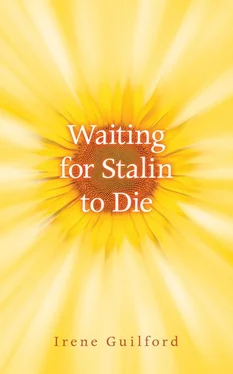He had been busy hurrying out the door, rushing to a meeting or to help a parishioner. Engrossed in his new duties, satisfied with his work, her unhappiness had registered only as a distant sound. She had turned away from him. She had latched onto Dobilas. And seeing his flighty sister poised on Dr. Prizura’s arm and on the brink of marriage, he hoped that she would not tire of it and that for all their sakes, it would last.
She had taken the news of their mother’s death with a toss of the head. Brushing away the few tears that had leapt, almost a surprise, to her eyes, she had stated that, as far as she was concerned, she didn’t care if she ever saw any of them again. You’re what matters to me, she had said. And understanding how much he would miss her, he signalled Steponas and Dobilas to take their places.
Steponas, turning to look at the bride, glanced up at Justine seated in the organ loft, his wife whom he had loved upon sight. She did not love him, this woman who sat beside him placid and absent, her touch one of habit rather than affection. She was a broken creature. With time she would mend. And with time surely love would come.
He had hoped that she would adapt, as they had all had to adapt, that a house and children would fill her days. Hoping that she might play, he had bought her an old upright Heintzman. When would I have time to play? she had snorted. She had seemed on the brink of saying more but bit back the words. And watching his gift stand untouched, he sensed her withdrawing even further.
He suggested that Eddie come to the house for lessons, fearing that it would only take her further from him. She had flushed with pleasure. She had bent towards the boy in care and love. And glancing up at her in the organ loft, Steponas hoped that one day, such love would be bestowed upon him.
Justine, feeling Steponas’ eyes upon her, looked away from him, her husband whom she could not say that she loved. He seemed to her a stranger, this man whom she did not understand and who could not understand her. Yet they had married. Two children had followed in quick succession. And waiting for fulfilment, she knew it would never come.
She had watched him presenting the piano, his face flushed with hope and excitement. Knowing it to be an attempt to buy her love, she also knew then that she would never be able to give it. You’ve wasted your money, she had said. And seeing his face fall, she felt herself ungracious but unable to be otherwise.
She would stand at the kitchen counter, peeling potatoes for supper. Digging her peeler into the white starchy flesh, she would release a wet crumbly spray onto her fingers. She would see Vilnius and the sunlit studio with the golden floors, the pearly white baby grand of the Morgensterns, the audition and Tony Ursell’s freckled hand on the nape of her neck. She would remember Madame Boulanger’s letter. If you are ever in Paris, come and see me. And bracing herself against the counter, she would wait for the moment to pass.
Justine, looking down from the organ loft at Maryte waiting behind the bride, envied the peaceful life to which she would return after the wedding. It was a mistake to give up being single, to marry and have children. She had lost freedom and solitude. She was trapped in the dissatisfaction of second-best. And placing her hands upon the cool organ keys, she released the low groaning moans of the wedding march.
Maryte, feeling Birute move forward at the burst of music, followed her towards the altar where Dobilas stood waiting, her brother for whom she lived. Her weakened mother had passed him to her on the morning of his birth. Take care of him, she had whispered with exhausted breath, he is yours now. And looking down at the new life squirming in her arms, she had felt fierce instant love.
She had sat sewing on the front steps, watching him play in the meadow in front of the house. Eating supper together on their laps as twilight gathered around them, they had pointed up at the benevolent stars. Their mother was one, their father another. They shone down on them. And thinking of her life without them, remembering her liaison with the commandant, she thought of it not just as the price of freedom but as a sort of love.
She followed Birute up the aisle, a woman she did not much like but would learn to live with for Dobilas’ sake. Learning to live without her brother would be harder. Please don’t forsake me, she beseeched with her eyes as she arrived at the altar. And accepting Birute’s bouquet of calla lilies, she stepped aside.
Dobilas, waiting at the altar for his arriving bride, looked past her at Maryte, his sister whom he loved with his whole heart. Catching her anguished look, his heart filled with tenderness for this sister who had been his whole life. Don’t worry, he promised with his eyes, I will not forget you. And watching her take her place in the first pew, he hoped that she knew that he would never stop loving her.
Dobilas, taking Birute’s hand, faced the altar and his future life. Closing his eyes, he heard the words of ceremony swirling about him. He thought of the old widow and widower leaning together on the fence, pointing and laughing as he spun in the meadow. He remembered Mrs. Moynahan’s stinging slap. He remembered Birute finding him and calling him stupid. And standing beside his bride, he felt the luckiest man alive.
They emerged into a morning filled with brilliant sunshine and congratulations. Standing on the church steps, they breathed the fresh spring air. Birute whispered that she was pregnant. His heart began pounding with happiness. And pulling her close, he tucked her hand under his arm.
The assembled guests waiting in Dr. Prizura’s garden applauded the arrival of the newlyweds. Taking his bride by the hand, the groom led her out onto the green sward. They began to waltz. They held one another in happiness. And whirling and twirling, tipping their heads back under an eternal sky, they released a joyful shout.
Hah!
Acknowledgements

Thanks to Petra Dreiser, Carole Giangrande and Antanas Sileika for their careful readings of the manuscript.
Thanks to Dr. Jane Howell for her medical expertise.
Thanks to Violeta Kelertas for her unflagging friendship.
Thanks to my editor, Michael Mirolla, for his eagle eye and his guidance.
Most of all, thanks to my parents and grandparents for teaching me about history. May they rest in peace.
About the Author

Irene Guilford is the author of a novel, The Embrace (Guernica 1999), and the editor of Alistair MacLeod: Essays on His Works (Guernica 2001). Her writing has been anthologized, translated into Lithuanian, and shortlisted for the CBC Literary Competition and the Event Creative Non-Fiction Contest. She lives in Toronto with her husband, Nigel.
Essential Prose Series 133

Guernica Editions Inc. acknowledges the support of the Canada Council for the Arts and the Ontario Arts Council. The Ontario Arts Council is an agency of the Government of Ontario.
We acknowledge the financial support of the Government of Canada.

TORONTO • BUFFALO • LANCASTER (U.K.)
2017
Copyright © 2017, Irene Guilford and Guernica Editions Inc.
Читать дальше














